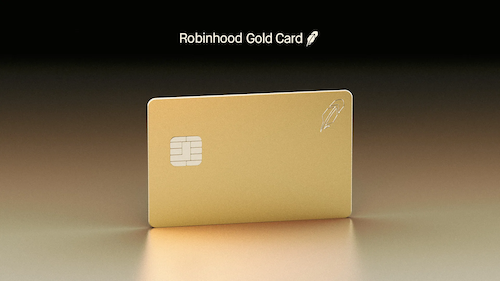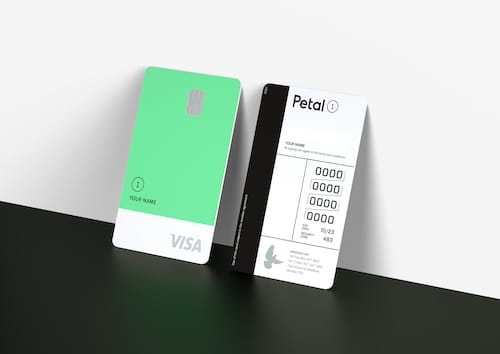CardsFTW #101: Deep Thoughts on Recent News
Plus, An Exit for Petal
Over the past few weeks, it feels like every call I am on has the same two topics: the Visa and Mastercard settlement and the Robinhood Gold Card. With no new card announcements that I’m aware of this past week (and coming back from a quick spring break trip), I wanted to take some time to dig into both of these further.
Card Steering

Conversations on LinkedIn have been quite intense lately as folks discuss both sides of the argument about what the settlement will mean for credit card surcharging and merchant practices.
Christopher Uriarte, one of the partners at Glenbrook Payments, a leading consulting firm on the merchant acceptance side, pointed out that some of the rules around surcharging haven’t really changed. Among the things that haven’t changed is that you can surcharge credit cards, but you can’t surcharge debit cards; it’s illegal. You have to disclose surcharges. Merchants are required to register their surcharge programs with the network and adhere to a surcharge limit, which will now be the lesser of 3% or the amount equal to their processing fees. This is set against a backdrop where major players like MasterCard are moving to reduce their surcharge limit to 3%, highlighting a shift towards standardizing these practices (formerly 4%).
You can't discriminate on a bank-by-bank or issuer basis, meaning you can't surcharge Chase but not Bank of America. With the new settlement, you can start adding product-level surcharging. For example, you could surcharge all Visa Infinite cards, which are really expensive for merchants, such as a Chase Sapphire Reserve, which is different than a Visa Signature or even a Visa Classic. Commercial cards are very expensive, and I think that might be where we see additional surcharges.
The reality is that some of these rules don't really matter in the real world. Last week, while I was on my brief spring break, I bought a sandwich at a small sandwich shop that proudly charged a 4% surcharge on top of a $15 sandwich. I know I'm not a normal person when it comes to thinking about these things, but I am continually shocked by the amount of rule-breaking that merchants do and the conversations they want to have, often talking about surcharging under the guise of sticking up for the little guy.
I'm also fascinated by the difference between how larger national merchants are excited about cards. You see this with an example like Sweet Green, a fast restaurant that only takes credit products and therefore has it built in–you may not surcharge if you only accept cards. The cost of accepting credit cards is the cost of the goods sold. It’s part of everything. You don't charge your consumers an ACH fee or a banking fee for that. They're all junk charges in my mind, much like the current administration is going after. Much like you could charge a consumer to help them try on clothes or get advice, you can also choose to give that for free and hope they buy from you. Imagine if Apple or Best Buy charged you for advice, whether you purchased or not. It would not go well. Certainly, some stores are very successful at that, and I think those stores will know that it is not ideal to surcharge consumers.
Others in the payment space have said that they think that the market will be more competitive because of how merchants will be able to compete better with card networks. There is this weird thing about card networks, which is that they're really paid through the banks, and they want to win bank business. The more money they give the banks, the happier the banks are, but that's not very good for the merchants. There will be more network competition from Discover and Capital One, assuming that the deal goes through.
A problem with product-level surcharging will be confusion. Imagine going in and seeing complex rates for something like a Chase Sapphire Reserve or even for a neobank card, like a Chime card, which is a higher interchange rate debit card. Do I want to stand at the point-of-sale and figure out my cost per card? I believe this is going to create a lot of friction between merchants and consumers, and no one really wants that.
What does this mean for card issuers? Does it mean that every merchant might not accept your card if the merchant doesn't want to accept something like Visa Signature? I believe it means that there may be a different surcharge on different cards, but they still are going to accept the card and steer between the different types. It's going to make it slightly more expensive to run a card program. There may be a move to take volume off of cards and move to cash by consumers who are extremely price-sensitive. The steering may cause premium cards to have a harder time getting volume. In addition, there is an overall slight change in the interchange that's going to be earned by the network, and I think that cost will come down to the banks.
What should card programs be asking themselves? They should be asking themselves: How does my P&L work as a whole? If I'm going to lose some interchange on one side, can I gain that back somewhere else? Are there minor things I can do to my card products that will save me those five, six, or seven basis points? How can I educate consumers about their rights?
I'm very curious with this settlement about what merchants are going to do with networks to rein in some of the bad behavior. I do not think that the convoluted legal language about surcharging vs. convenience discounts for cash, different rules in different states, and different rules among different merchants is a good thing. I think it's just going to get much more complicated.
I've been asked by many clients what this means for them. Somewhat, I don't think it means anything yet, unfortunately. It means we need to keep an eye on what's happening next.
There’s Gold in That There Card

Everyone has been talking about the Robinhood Gold Card with its 3% cashback. It is an astounding deal.
Some points nerds would argue that the Robinhood card is not the best deal because you do have to pay a fee for it, and there are other card hacks that can get you to a similar high value. This is where you have to start doing the math on what's better for you. Do you qualify for these higher-value things? Do you have a setup that’s known as the Chase trifecta where you can attach three different Chase cards - the Freedom, the Freedom Unlimited, and the Sapphire Reserve in such a way that you’re earning at least 2.25% on everything and sometimes much more? Or is the simplicity going to win?
And how do consumers feel about Robinhood? Do they feel like their money is safe there? Will they get underwritten? Will they get good credit limits?
I do think that there are two very large consumer groups out there. Those who want to argue in online forums, or at least with their friends, about how to optimize their credit card rewards. And those who just want to keep it simple.
The Robinhood card is a good play for those who want to keep it simple. Many have pointed out that Robin Hood is going to lose money on a transaction basis. There's no arguing there. The card will likely bring in somewhere around 2% in interchange and will be paying out 3%. However, I think Robinhood is making an internal argument and has plans, I would assume, to build out a card program that is profitable to them through the broader business. Based on industry averages, 30% or more of those cardholders will be revolving their balance, and Robinhood will earn a net interest margin. Some new folks will come in who will also pay for Robinhood Gold, which is a pretty good set of deals. People will invest money - Robinhood makes money when you're trading and doing other things. It's an overall relationship product.
I think it does stand out because Robinhood is a big brand with lots of press, lots of consumers, lots of reach with younger consumers who have often not yet had full alignment with an individual credit card issuing brand, and is something new and exciting. We often forget about some of the large growth brands like Upstart that have made a case for fintech cards that we don't normally talk about because we spend so much time talking about rewards cards or other unique things, but lending is important, and cashback is important. And I'm pretty excited to see where this goes.
Petal Goes to Empower

A big announcement yesterday: Empower, an eight-year-old personal finance and lending startup with more than $175MM in funding, is acquiring fellow fintech startup Petal. Founded in 2016, Petal is one of the longest-surviving fintech companies offering credit-building credit card products. Petal has raised nearly $1B in equity and debit. Rumors late last year that Petal was seeking a buyer turned out to be true with this announcement.
From the outside, this looks like a deal that will not allow Petal’s employees or investors to do well, although no details on the terms were provided. Not sharing usually means it wasn’t good.
Some upside remains for early Petal investors as the company spun out its underwriting platform as Prism Data in early 2023. I was always impressed by what Petal built over the years, and its method of cash-flow underwriting has been adopted by some larger competitors. I’ll be watching to see what happens to Prism’s card product under new ownership.
CardsFTW
CardsFTW is a weekly newsletter, released most Wednesdays, that offers insights and analysis on new products in the credit and debit card industry for consumers and providers. CardsFTW is authored and published by Matthew Goldman and the team at Totavi. Totavi is a boutique consulting firm specializing in fintech. We bring real operational experience that varies from the earliest days of a startup to high-growth phases and public company leadership. Visit www.totavi.com to learn more.
